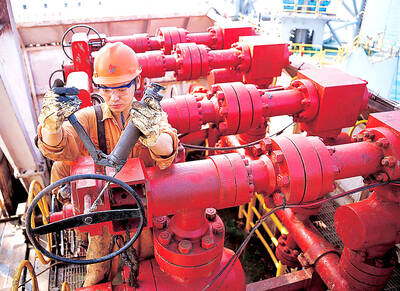A stiff neck accompanied by muscle twitches might indicate a condition known as cervical or neck dystonia, caused by the muscular hyperextension of the neck, Tainan Municipal An-Nan Hospital neurologist Tsai Ming-chun (蔡銘駿) said on Monday.
Neck dystonia occurs when muscles involuntarily contract, leading to a tilted head that is accompanied by muscle jerks and twitches, Tsai said, adding that while the symptoms can be relieved by massaging the affected areas, spasms or compressed nerves might lead to extreme pain.
The condition is classified by the position of the head, he said, adding that it is called laterocollis when the head tilts to left or right, retrocollis when it tilts backward and anterocollis when it tilts forward.
While severe cases usually get reported, patients suffering from mild or moderate neck dystonia usually do not seek medical help, Tsai said.
In mild cases, patients might have the feeling that their clothes fit tighter on one shoulder or have trouble craning their necks, he said.
Tsai said that a patient, surnamed Ho (何), started showing signs of neck dystonia after working overtime for five months, and also started suffering from insomnia due to persistent stiffness and pain in his arms, shoulders and neck, adding that his condition did not improve after taking a day off to sleep for more than 10 hours.
Hoe was diagnosed with neck dystonia and was treated with botulinum toxin injections, known as Botox, Tsai said.
Botulinum toxin is a neural signal blocker that is used for treating neck dystonia, Tsai said, adding that the injections usually take between one and two weeks to take effect.
The treatment is effective for four to six months and patients receive between three and four injections per year, with more than 70 percent of the patients reporting total recovery or significant improvement, Tsai added.
However, Tsai warned that botox is known to have a number of side effects, including localized muscular weakness, difficulty in swallowing and fatigue.

The Chinese military has built landing bridge ships designed to expand its amphibious options for a potential assault on Taiwan, but their combat effectiveness is limited due to their high vulnerability, a defense expert said in an analysis published on Monday. Shen Ming-shih (沈明室), a research fellow at the Institute for National Defense and Security Research, said that the deployment of such vessels as part of the Chinese People’s Liberation Army (PLA) Navy’s East Sea Fleet signals a strong focus on Taiwan. However, the ships are highly vulnerable to precision strikes, which means they could be destroyed before they achieve their intended

About 4.2 million tourist arrivals were recorded in the first half of this year, a 10 percent increase from the same period last year, the Tourism Administration said yesterday. The growth continues to be consistent, with the fourth quarter of this year expected to be the peak in Taiwan, the agency said, adding that it plans to promote Taiwan overseas via partnerships and major events. From January to June, 9.14 million international departures were recorded from Taiwan, an 11 percent increase from the same period last year, with 3.3 million headed for Japan, 1.52 million for China and 832,962 to South Korea,

SOVEREIGNTY: The rigs show that Beijing ‘rejects Taiwan’s jurisdiction’ by building in areas where Taipei demands permission to build or alter installations Chinese oil rigs have been sighted just 26 nautical miles (42km), from Taiwan’s exclusive economic zone (EEZ) near Pratas Island (Dongsha Island, 東沙島), posing a threat to Taiwan’s sovereignty if left unchallenged, a brief published by the Jamestown Foundation on Tuesday said. Pratas Island, 444km from Kaohsiung, is northeast of the South China Sea and houses a Taiwanese garrison. The brief, titled “Rigging the Game: PRC Oil Structures Encroach on Taiwan’s Pratas Island” — referring to the People’s Republic of China — analyzed photographs and said that Beijing’s tools to pressure Taiwan now include oil rigs. “Oil rigs now constitute part of Beijing’s

The Taiwan Experience Education Program (TEEP) has funded short-term internships in Taiwan for more than 4,500 young people from more than 40 countries since 2015, with the goal of attracting and retaining international talent, the Ministry of Education said yesterday. Fifty-five colleges launched 514 projects this year, including in fields such as semiconductors, artificial intelligence, medicine and biotechnology, green energy, and sustainability, it said. The program provides research and practical internships in Taiwan for two to six months, and offers cultural exchange and networking opportunities, the ministry said. For example, National Formosa University’s Embedded System and Autopilot Laboratory developed two solar-powered drones in